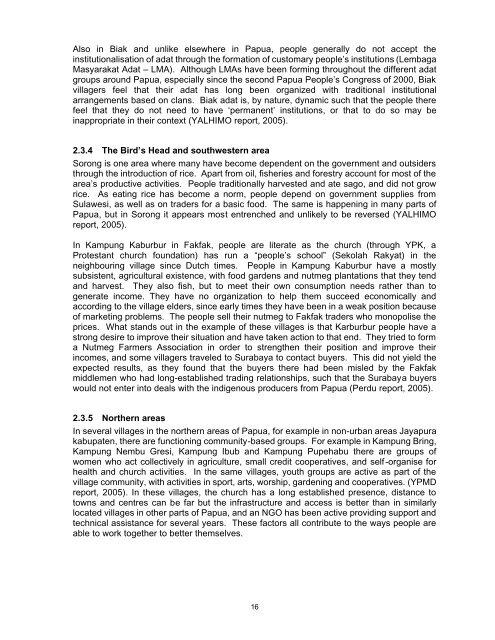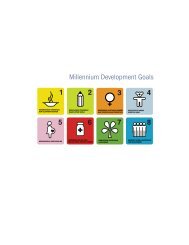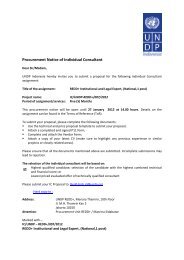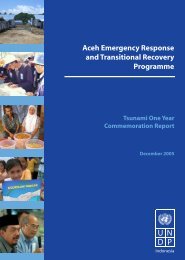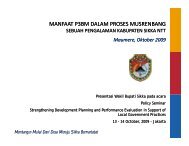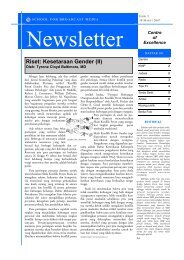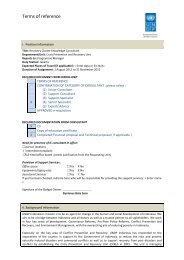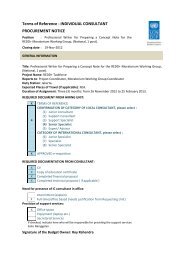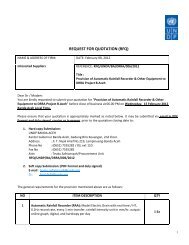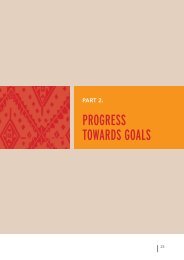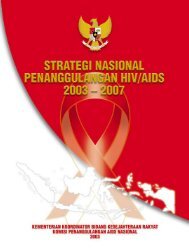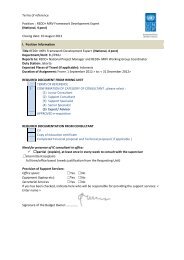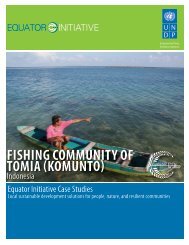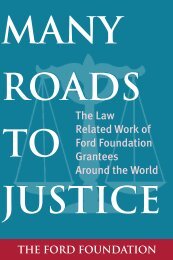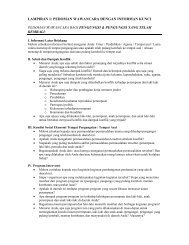Community Livelihoods And Civil Society Organisations In - UNDP
Community Livelihoods And Civil Society Organisations In - UNDP
Community Livelihoods And Civil Society Organisations In - UNDP
Create successful ePaper yourself
Turn your PDF publications into a flip-book with our unique Google optimized e-Paper software.
Also in Biak and unlike elsewhere in Papua, people generally do not accept the<br />
institutionalisation of adat through the formation of customary people’s institutions (Lembaga<br />
Masyarakat Adat – LMA). Although LMAs have been forming throughout the different adat<br />
groups around Papua, especially since the second Papua People’s Congress of 2000, Biak<br />
villagers feel that their adat has long been organized with traditional institutional<br />
arrangements based on clans. Biak adat is, by nature, dynamic such that the people there<br />
feel that they do not need to have ‘permanent’ institutions, or that to do so may be<br />
inappropriate in their context (YALHIMO report, 2005).<br />
2.3.4 The Bird’s Head and southwestern area<br />
Sorong is one area where many have become dependent on the government and outsiders<br />
through the introduction of rice. Apart from oil, fisheries and forestry account for most of the<br />
area’s productive activities. People traditionally harvested and ate sago, and did not grow<br />
rice. As eating rice has become a norm, people depend on government supplies from<br />
Sulawesi, as well as on traders for a basic food. The same is happening in many parts of<br />
Papua, but in Sorong it appears most entrenched and unlikely to be reversed (YALHIMO<br />
report, 2005).<br />
<strong>In</strong> Kampung Kaburbur in Fakfak, people are literate as the church (through YPK, a<br />
Protestant church foundation) has run a “people’s school” (Sekolah Rakyat) in the<br />
neighbouring village since Dutch times. People in Kampung Kaburbur have a mostly<br />
subsistent, agricultural existence, with food gardens and nutmeg plantations that they tend<br />
and harvest. They also fish, but to meet their own consumption needs rather than to<br />
generate income. They have no organization to help them succeed economically and<br />
according to the village elders, since early times they have been in a weak position because<br />
of marketing problems. The people sell their nutmeg to Fakfak traders who monopolise the<br />
prices. What stands out in the example of these villages is that Karburbur people have a<br />
strong desire to improve their situation and have taken action to that end. They tried to form<br />
a Nutmeg Farmers Association in order to strengthen their position and improve their<br />
incomes, and some villagers traveled to Surabaya to contact buyers. This did not yield the<br />
expected results, as they found that the buyers there had been misled by the Fakfak<br />
middlemen who had long-established trading relationships, such that the Surabaya buyers<br />
would not enter into deals with the indigenous producers from Papua (Perdu report, 2005).<br />
2.3.5 Northern areas<br />
<strong>In</strong> several villages in the northern areas of Papua, for example in non-urban areas Jayapura<br />
kabupaten, there are functioning community-based groups. For example in Kampung Bring,<br />
Kampung Nembu Gresi, Kampung Ibub and Kampung Pupehabu there are groups of<br />
women who act collectively in agriculture, small credit cooperatives, and self-organise for<br />
health and church activities. <strong>In</strong> the same villages, youth groups are active as part of the<br />
village community, with activities in sport, arts, worship, gardening and cooperatives. (YPMD<br />
report, 2005). <strong>In</strong> these villages, the church has a long established presence, distance to<br />
towns and centres can be far but the infrastructure and access is better than in similarly<br />
located villages in other parts of Papua, and an NGO has been active providing support and<br />
technical assistance for several years. These factors all contribute to the ways people are<br />
able to work together to better themselves.<br />
16


